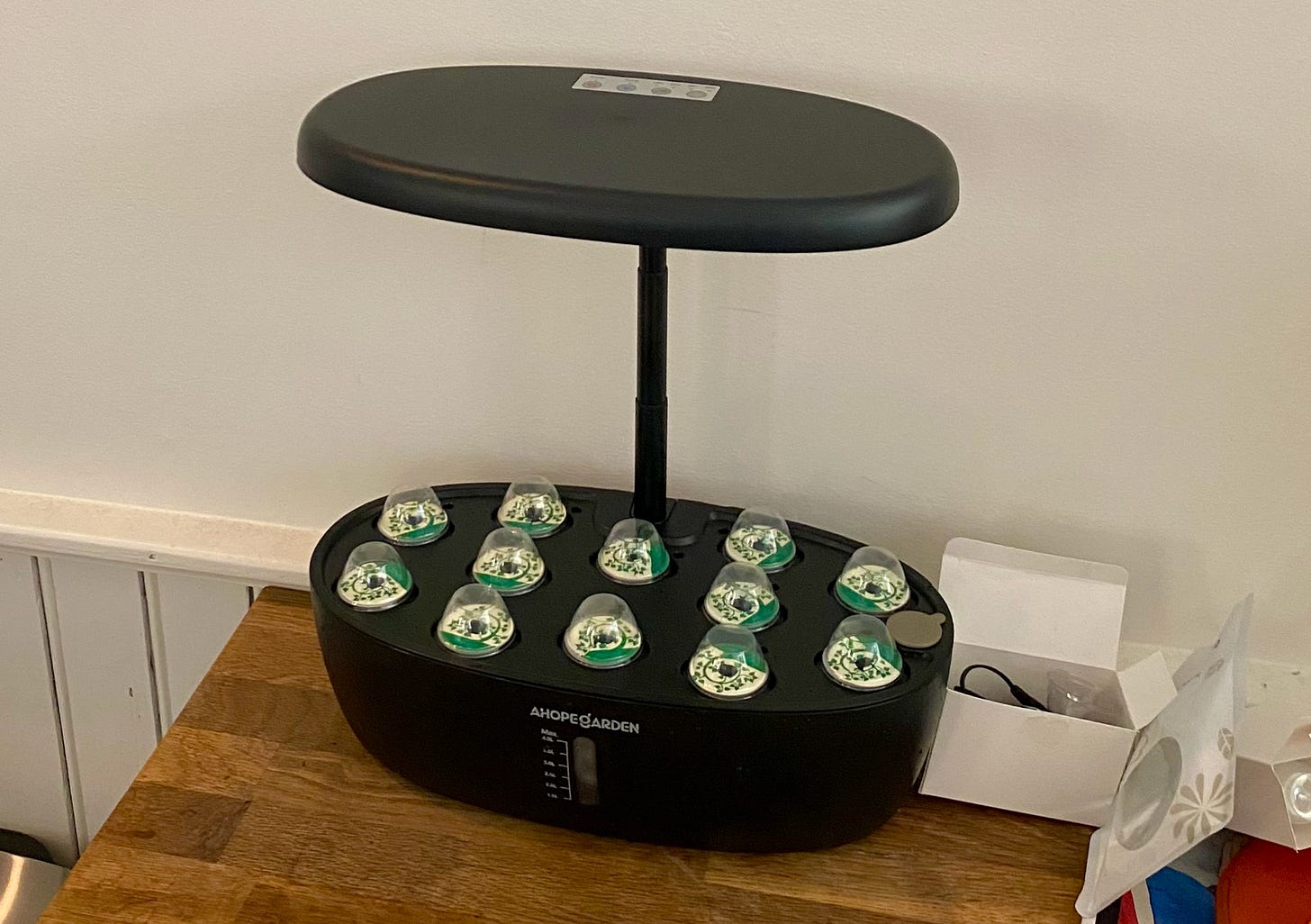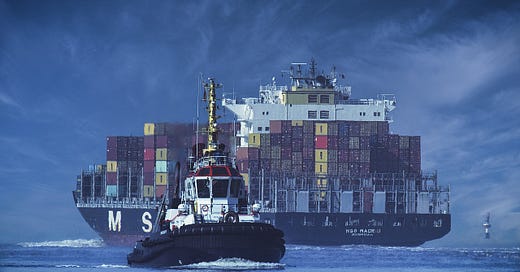The last time I checked my phone, the Consumer Financial Protection Bureau was turned into a gravestone emoji. Tariffs are about to create the next Black Monday stock market collapse, or they are the world’s most powerful negotiating tactic that no one decided to use until now. Twenty-five-year-old lackeys were given all the keys to the Treasury coffers, or maybe they were just playing around. USAID funds were gargantuan pools of leftist soft power or they were just a trickle of money supporting a miniature circus in Bratislava. Bird flu deleted every egg from the supermarket or bird flu is just one of those fake viruses RFK will cure with hard work and methylene blue.
How bad could it get? My boyfriend asks me and my coworkers ask me and newspapers ask me. There’s no one in this country who knows. There’s no controlling a king when he decides every elected member of government (aside from himself) doesn’t matter anymore.
I asked my friends what they should stock up on:
- “Energy, in the broadest sense. Coffee. Adderall. Computers. Emotional, psychological, physical fortitude. Nuclear. The grid. All of it.” - Katherine Dee, internet culture writer
- “Bitcoin.” – Ann Manov, literary magazine editor
- “Seed oils.” - Rahul Sonwalkar, CEO, julius.AI
We’re left to ourselves, isn’t that the joke? Every man for himself, even though almost half the country relies on welfare which is either stopping or it isn’t stopping.
Maybe I should grow some food of my own, but I don’t have outdoor space for a garden. Will the Financial Times tell me when it's time to switch from maple syrup to corn syrup? Maybe I should save more of my paycheck. But maybe the Doomsday Clock is so close to doom that me and the other scientists at the Bulletin of the Atomic Scientists should just give up and get beers? Feeling confused and demoralized, I decided to ask my friends what they’re doing.
People should stock up on….
“...Durable goods produced abroad for which there aren't affordable domestically-produced substitutes. If you're lucky enough to have the budget for an elite Italian sports car, now's the time.” - Guy Berger, economist
“I’m buying a new GPU before tariffs kick in, and I know friends who were scrambling to buy camera film for the same reason. Unfortunately, avocados don’t store well, but at least tequila does.” - Joey Politano, economic commentator
“…Private sector job opportunities.” - John Horton, economist
Maybe the trade war won’t happen. Maybe nuclear war will. That’s kind of the beauty of the Trump-Musk Presidency—they don’t know either.
At least in theory, there are all kinds of political adaptations, ranging from protests to what I hope is happening to the Eight Sleep mattresses delivered to the Office of Personnel Management. But economic adaptation to what one might call “high uncertainty” is something we all must do, whether we like it or not. Because for some people, life will change very little in coming years (the increase in the tennis club membership fee will go unnoticed; the permitting for your Texas oil rig will finally go through). But the rest of us have to eat food, buy things, and go to work. (Or apply for work. Just imagine the job market for climate work after thousands of people are laid off from the EPA.)
Earlier this week, I scrolled a little too far down a timeline and found myself paralyzed by fear that even if the food system wasn’t going to collapse, the tariff situation with Mexico would soon imperil the quality of my food to the extent that everything would be sprayed with pesticides that would give me cancer. And I did what the most rational, high-intellect person in this situation would do, which is: listen to Animal Collective, lie down in a dark room, ignore a call from my mom, and buy a hydroponics garden system for my kitchen.

I’ve written before about exercising humility towards prediction in the face of uncertainty, so I’ll admit I’m being a little hypocritical here. But the situation seems different when it’s less about safeguarding corporate profits and more about safeguarding your access to fresh food. Everything seemed overly alarmist until all foreign aid was cut off and the decision was made to just let people die.
“A 25 year old former Spacex employee Marko Elez is pursuing source code changes to the system that holds all your private information and makes 88% of government payments. We are risking the literal collapse of the United States government. The closest analogy is to the collapse of the Soviet Union except without the relatively responsible behavior of government officials that Soviet and Former Soviet officials showed (relative to our situation).” - Nathan Tankus, author of Notes on the Crises
The Tax Foundation estimates the tariffs on Mexico, China, and Canada, proposed to go into effect on February 4, 2025, would shrink economic output by 0.4 percent and increase taxes by $1.1 trillion between 2025 and 2034, amounting to an average tax increase of more than $800 per US household in 2025.
It’s Fuck Around and Find Out-nomics. It’s idiocy. It’s a joke. It’s “a black hole” that leads to big profits (?).
Maybe at this point you could say: groceries got expensive in 2022, and nothing has materially changed since then. But neglecting to consider the implications of future foundational forces of the economy on your personal well-being is like neglecting to check if it’s raining before heading out the door to work. You should at least have an idea.
I know that it is difficult to be confronted with the whiplash of New York Times notifications everyday. Glance at a push notification during a meeting, learn that the IRS may not exist anymore. But it’s a reason why news management has never been more important than ever, especially as the Pentagon “rotates out” the largest news outlets in the country from its press halls.
I’ve overheard plenty of people talk about their decision to lean out of the news completely because it’s depressing, and I don’t agree with them. On one hand, it’s a good—even great—idea to limit excessive news intake, but the idea of abandoning it altogether seems as naive as it is backwards. The easiest population to control is an apolitical one.
Economic resilience starts with the idea that you know what to be resilient towards.
How stable is your job?
Do you buy much foreign produce?
Will you need a new phone or computer sometime soon?
Can your savings account cover the price increases from all the other goods downstream of foreign products?
If you can’t, can you marry someone rich like the Bennet daughters of Pride and Prejudice?
People should stock up on…
“…Equanimity. Things will get worse and there’s not much we can do about it. Cultivate inner peace and find a way to keep going.” - Wendy Liu, writer
“I am pro-generosity, so I can’t recommend stockpiling material goods. But you should probably know how to get them if you need them. Advance these stats: Real friends. Negotiation skills. Stealth.” - Cydney Hayes, writer
Because of its capacity to redistribute power, a trade war is never just a trade war. Its a shift in who wins and who gets priced out of survival, serving as a quick lesson in how we are tethered to each other in deeper ways than 40x48 pallets of tequila and maple syrup. With such a wide range of potential outcomes ahead, it becomes incumbent upon you to materially support your universe of friends, acquaintances, coworkers, and bodega guys. As a term, “community” is overused and over-generalized, but it is the force that opposes the more rapacious and individualistic form of capitalism that the total erasure of governance structures represents.
If tariffs hit, if institutions hollow out, if everything from computers to canned beans is priced like a luxury good, then adaptation is an inevitability. The playbook to surviving a trade war, or any of the wars that could start in the next few years, doesn’t exist yet, but that doesn’t mean we shouldn’t be writing it in real time. Together at least we can recognize that this moment of tremendous institutional decay wrapped in absurdity offers at least some understanding of what is to come.






We can never be fully prepared for what’s to come 😅
Is the easiest population to control an apolitical one? Wouldn’t it be one bought in to the political agenda of whatever administration is in charge?